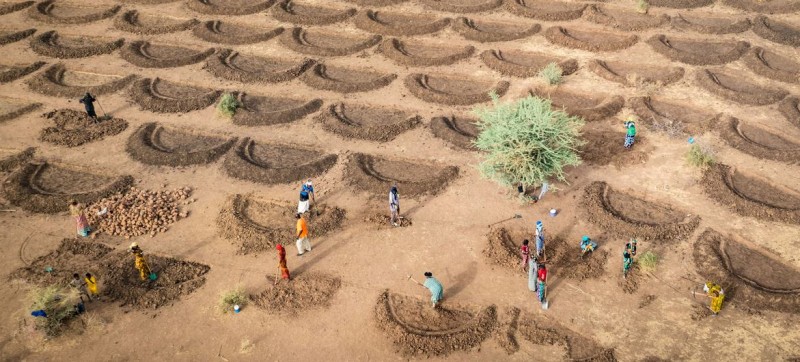© FAO/N Tuan Anh A farmer in Viet Nam harvests her crop.
Corinna Hawkes the Director of the FAO Division of Food Systems and Food Safety says a holistic and sustainable approach is needed that considers economic, social, and environmental factors, and that brings people together, to ensure nutritious food and sustainable livelihoods for all.
She was speaking ahead of the UN Food Systems Summit+2 Stocktaking moment, which will consider global agrifood systems.
What is the agrifood system?
Corinna Hawkes: The agrifood system is everything that is connected to food and agriculture. What we eat as well as the way that food is sold, distributed and processed. It also includes how food is grown or harvested on land, at sea, and other non-food products, such as fuel and fibre. All these processes involve a whole host of activities, investments, and decisions.

© FAO/Giuseppe Carotenuto Corinna Hawkes, Director of Food Systems and Food Safety Division at FAO.
An agrifood system pulls together all of this into an interconnected system; for example, if we want to grow fruits and vegetables for people to eat healthier, we have to think not just about growing the vegetables, but also about how they are delivered to people.
Agrifood systems are also a space for solutions including for climate change, biodiversity loss, malnutrition, chronic diseases, unsafe food, poverty and to counter a lack of urban sustainability. Agrifood systems are the solution to the world’s most important challenges.
Why does the world need to transform agrifood systems?

© IMF/Andrew Caballero-Reynolds A fisher in Ghana collects the morning catch.
Right now, the power to provide those solutions is not there. The agrifood system is sick. The way it is designed and functions means that it is weak, worn out and lacks resilience.
So, the frustration and the challenge here, is that the potential power of the agrifood system to provide these solutions is lost until we transform it to make it stronger.
Some of the major challenges include the way food is grown and produced is contributing to climate change, which in turn weakens the agrifood system.
What is an example of a current major challenge in agrifood systems?
One thing we have done is to take too much diversity out of the system which includes everything from what is on our plates all the way back to the farm. So, we need to bring that diversity back.
Over the last decades there has been a specialization in producing certain key commodity crops. This was a great idea from the perspective of productivity and efficiency; it cheapens food, it means you can trade the food, and it reduces the cost of production. It is important we produce these crops efficiently.
But what we have seen is that reducing diversity too much reduces the resilience of the system. And we have seen with recent conflicts how reliance on certain key producers further weakens resilience.
Diversity is also good for biodiversity and the environment, as well as nutritionally for consumers.
How can these challenges be overcome?

© WFP/Evelyn Fey In Senegal, new farming approaches are being introduced to counter the impacts of climate change.
There are many ways to transform agrifood systems. The most important way is to bring all the systems together which necessiates bringing people together.
One of the major challenges is that different people are trying to fix biodiversity, nutrition or food safety, while others are trying to fix poverty and the livelihoods of agricultural producers.
We need to come work together in the system and figure out how to provide these solutions. This way we will begin to see that the agrifood system may appear to be a problem because it is weak, but it actually is something really powerful.
What good practices are being advanced right now?
I am really excited about some of the initiatives that are taking place at the subnational, urban and city levels. There is so much energy in large and small cities where local authorities and multiple stakeholders are really taking action.
They are improving market infrastructure so that people are more able to access food, so that food is safe and loss and waste is reduced.
So, we are beginning to see these important connections being made, and that is happening in hundreds of cities around the world.
What can we expect from the upcoming UN Food Systems Summit +2 Stocktaking Moment?
What I am hoping to see from the Stocktaking meeting two years after the UN Food Systems Summit is that governments and many other stakeholders will come together to honestly discuss the challenges and to share their successes and their challenges in making change.
I would like to see a sense of solidarity between governments and other stakeholders who can agree that they will do better together if they share experiences and good practices to overcome challenges.
The ideal outcome of the summit is that the momentum created will continue and that the commitment to change will not just stay as a commitment but will lead to actions on the ground to really bring change.

2023 UN News User Survey
Thank you in advance for agreeing to participate in our survey so we can improve and tailor our products to your needs. The survey will take no more than 4 minutes to complete.

